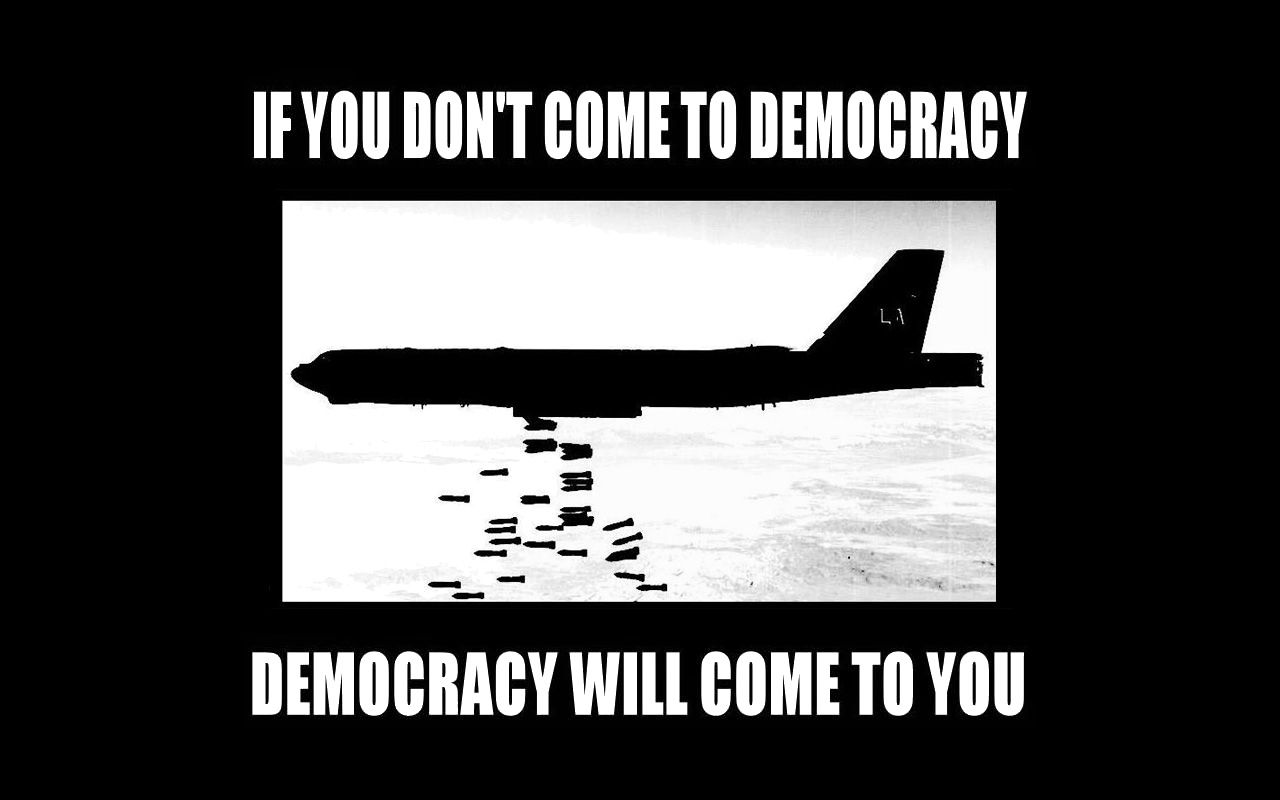Error found installing democracy… Have you tried turning it on and off?

Here’s an interesting image I found about Democracy. I do believe the “Please remove System” to be quite intentional here. Have a thought about it while reading!
https://drkokogyi.files.wordpress.com/2012/06/democracy.jpg
It was in my latest Arts Studies class that we were discussing a portion of English Theorist Butler’s Frames of War. The chapter we were reviewing was “Survivability, Vulnerability, and Affect” and covered (as the name suggests) much about vulnerability of countries after acts of terror (such as 9/11) and during war.
She suggests that while times of conflict occur acting forces such as the US media look to decide who is “us” and who is “the enemy.” This binary causes several problems (as discussed on my last blog post) and in the end, it generally gives us a bi-polar system of two countries waging war – often ending with the U.S. Hegemon fighting another Hegemon, or terrorist group.
An issue pops up when the West feels obliged to intervene in other countries’ affairs and “install democracy” (Butler 37). She argues that this feeling of responsibility is irresponsible and is an initial trigger for many problem dominos to fall. Let me elaborate: in the example of the US – if the US did not create this us vs them binary, the would be enemy could possibly be deemed as grieveable. This in turn knocks over the next domino and would lead to the internal population to have mixed emotions about an armed conflict and perhaps even destabilize political authority. Finally, this could conclude in support for a war turning foul.

We continue to see the binary here…
http://4.bp.blogspot.com/-rpdDEMcnpAU/T6s9XcdHFsI/AAAAAAAAEcY/Umnc3NRxBxc/s1600/B52+Democracy.jpeg
An example of this is the Vietnam War, which was known as the first “TV War”. It is highly debated about the use of free media in the war, and many consider the media to be a large factor in the U.S. withdrawing from Vietnam. While the US population at first supported US intervention in Vietnam, support for the war turned sour in the late sixties.
Vietnam had a whole culture surrounding it: check out Fortunate Son, often referred to as the Vietnam song.
https://www.youtube.com/watch?v=ev4xj0y5jbQ
Many refer to the Tet Offensive as the turning point in U.S. public support for the Vietnam War. This was when the public learned that in order to win the war, there was to be many more US casualties to be had. With the loss of public support, the US concluded with a withdrawal.
This corroborates with Butler’s argument in that US citizens showed a form of “public grieving” for the war. The conclusion of the conflict in Vietnam ending with a withdrawal also supports Butler’s argument of political disruption alongside public grieving.
This is significant to the class because it shows us that “installing democracy” in a puppet regime such as South Vietnam that does not want democracy installed is not ideal, if not impossible. Even if the population were forced into installing democracy, one could argue that the population would only view it as a virus infecting Vietnam’s true desire (which was to unify with the Communist North).

Clearly Vietnam didn’t have a second. I wonder if Iraq will?
http://imgur..com/0WuxLoZ
What would happen if we were to take the situation in Vietnam and apply it to our modern conflicts? It is apparent that the U.S. has learned their lesson not to allow the media to interfere with war if they want any hope of winning a war. If we were to even consider the perspective of an enemy nation such as North Korea, perhaps we would find solutions other than nuking each other. Just maybe.
Butler, Judith. Frames of War: When is Life Grievable?. London: Verso, 2009. Print.
Raymond Li
